|
There's an engagingly offbeat and attention-grabbing introduction to one of the key characters early on in the captivating 1972 Czech film Morgiana, which was directed and co-written by Juraj Herz, whose 1969 The Cremator [Spalovac mrtvol] is one of the truly great works of the Czech New Wave and a personal favourite of this humble reviewer. As the first of the two female lead characters tucks into her breakfast, an almost fish-eyed subjective camera snakes across the floor and makes its way towards the dining table. Is this an intruder? It seems unlikely at this height and speed, and neither the woman nor her maid react to its presence. A disembodied spirit perhaps? Could be. It then glides up onto a chair to observe the two women from across the table. Still they fail to react to its presence. Only then does a change of viewpoint reveal the identity of this mysterious entity. It's a cat. Suddenly all that has gone before makes perfect sense. It's a couple of minutes more before we learn the cat's name – Morgiana – and to which of the two sisters it owes its fragile allegiance.
Cats, of course, have a long history in horror and mystery stories. Movie dogs may be ferocious and have an almost psychic ability to instantly recognise the bad guy, but cats have achieved a unique position in the hierarchy of movie animals, enigmatically cast as everything from vengeful spirits to hosts for human reincarnation. In European folklore they were companions to witches, in China they were symbols of love, peace and good fortune, while in Ancient Egypt they were elevated to the status of gods. Black cats in particular have a special resonance. In the famed short story by Edgar Allen Poe, a black cat seemingly returns from the dead to haunt the story's narrator, and while Japanese mythology is littered with stories of animal spirits, the black cat holds a special position and is generally regarded as the most powerful of all. But a cat doesn't need be black to be sinister or mysterious. Such is the legacy of the aforementioned Poe story that you only need a close-up of a cat coldly observing a perpetration of evil to know that it will somehow be instrumental in the downfall of the wrongdoer in question. And when the name of the cat is the title of the film, then there can't help be an expectation that the animal is going to prove more than just feline window dressing.
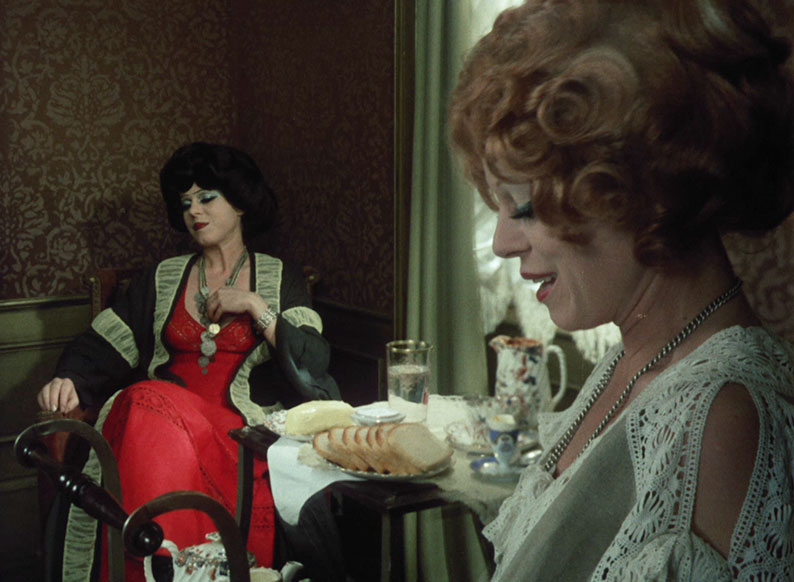
Central to the story, this story, are sisters Klára and Viktorie, who on the death of their father take possession of his bequeathed estate. Viktorie gets his country house and hunting lodge, and Klára gets the rest, which includes his villa, his shares, and the contents of his bank accounts, which we can assume from the surroundings, amount to a pretty penny. Viktorie elects to move into the hunting lodge, known as The Green Flute, but Klára dislikes the place and declines an invitation to join her. Her unease, according to her sister, has grown from a fear that the building is haunted by its former owner, a ballerina who was driven to her death by her jealous lover.
It soon becomes evident that Viktorie is fiercely envious of her younger sister's popularity, especially with the dashing Lieutenant Marek, who’s in love with Klára but dislikes Viktorie, who appears to have had her eye on him for some time. A tarot card reading suggests that all that Viktorie desires will be hers if she can just deal with the woman who stands in her way, and to this end she procures a slow acting poison that is guaranteed to leave no medical trace. She drops it in Klára's tea, but as her sister's health begins to fail, Viktorie becomes tormented by guilt and is targeted for blackmail by the woman whose brother provided her with the potion.
Although based on a 1929 novel by Russian writer Aleksandr Grin, there's more than a whiff of Poe about Morgiana,* from the role played by the cat to the manner in which the guilt of the crime haunts its perpetrator. That it's a period piece helps, but exactly what period or even what location remains an enigmatic uncertainty, a corner of rural Czechoslovakia trapped somewhere between the past and the present, in which candles adorn rooms with working electric lights, while the dress sense and makeup of the female characters suggest that they are all auditioning for roles in one of Ken Russell's more flamboyant historical biopics. And yet, like Russell at his most colourful, this gameplaying with reality enriches the surface detail of a film that is always much more than the mechanics of its plot, engagingly twisty and even surprising though they prove to be.
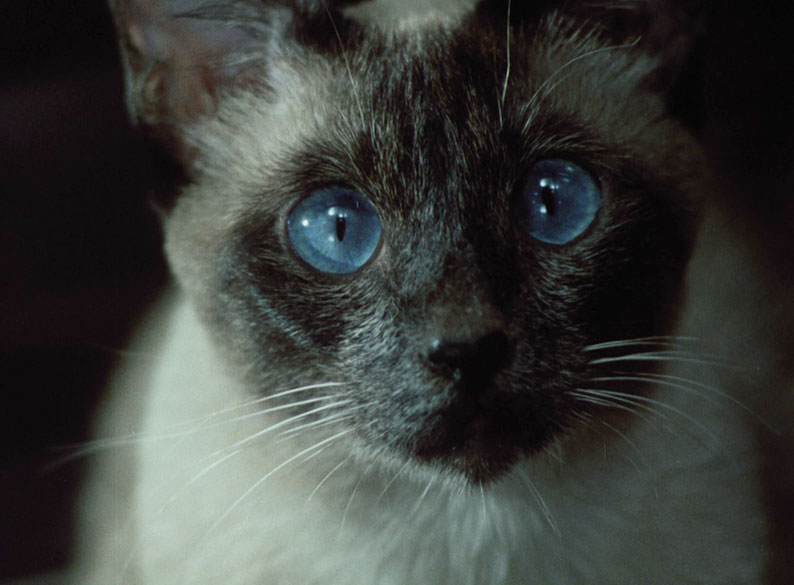
Nothing about the handling could be labelled pedestrian. The opening pre-title funeral is a case in point, with the focus on the sisters' feathery headgear, the decision to shoot the lowering of the coffin to its place of burial from inside the grave, and the concealment of the women’s faces beneath dense black funeral veils during the will-reading that follows all establishing an air of unease even before the first inkling of murderous intent. Following a title sequence peppered with abstract, quasi-vaginal paintings that would not be out of place in Obayashi Nobuhiko's gloriously bonkers 1977 horror opus Hausu, the sense that something is amiss between the two sisters is neatly captured by a conversation about their sisterly relationship that takes place almost entirely in the shadows.
It's shortly after this that we get our first taste of the above-mentioned cat-camera, a point-of-view wander in extreme wide-angle that plays almost like a template for The Evil Dead's celebrated forest-demon POV shots. As Viktorie puts her murderous plan into motion, Morgiana watches on like a feline surveillance camera charged with recording every misdeed for later prosecution in some supernatural court. And having gone to so much trouble to procure what may have been the only super-wide lens in the country, director Herz and cinematographer Jaroslav Kucera were clearly keen to make full use of it, adding a troubling edge to scenes of emotional conflict and emphasising the increasingly ill Klára's disorientation and dizziness. This is taken a trippy step further when the image is fractured through the use of front-of-lens prisms, an effect I watched with a pang of nostalgia, having employed the very same trick a good many years ago in an early 8mm stab-in-the-dark attempt to capture the feel of a waking dream, something Herz and Kucera achieve here with considerable aplomb.
The tale unfolds like a melodrama on acid, exaggerated and restrained in the very same breath, with theatrical expressions of emotion tempered by a wealth of sometimes unsettling suggestive detail, much of which can only be properly appreciated on subsequent viewings. Even seemingly straightforward scenes are on second glance revealed to be anything but (just take a look at the framing and editing of the open-air sequence in which Viktorie eavesdrops on Klára and Marek) and can suddenly give way to unexpected angles, dizzying wide shots, or intimate and sometimes semi-hallucinatory close-ups. Lubos Fiser's score, meanwhile, flits between the romantic, the creepily atmospheric, and the sort of bombastic brass fanfares that Hammer reserved for their most sensationalist shock moments.
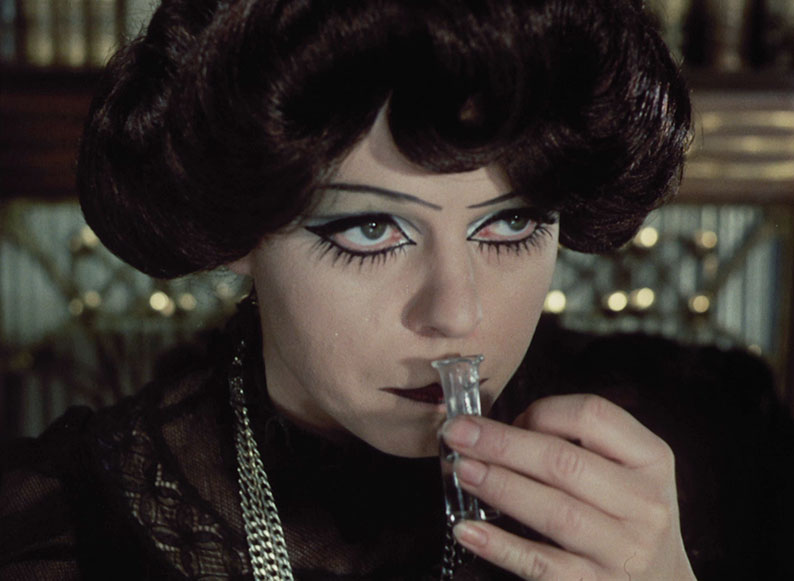
The performances are similarly ranged in style, from Josef Abrhám's low-key turn as Lieutenant Marek to Karel Augusta's almost comically brusque doctor, and an attending nurse who appears to preparing for a career as a scheming Mother Superior in nunsploitation cinema. But rightly stealing the show are two superb central performances that could prove the film's most successful surprise for an unsuspecting western audience. Going back to the film after a break of over a decade, it now seems clear from the off that Klára and Viktorie are both played by respected actress Iva Janžurová, something those of you more immersed in Czech cinema of the day will have realised from the moment they put in their first dual appearance. However, although a once familiar face in her native Czechoslovakia, Janžurová’s lack of international exposure and the distinctive manner in which she plays the two sisters – coupled with the differences in their appearance and some wonderfully sleight-of-hand filmmaking – meant that when I first watched the film, neither I nor my viewing companion realised this was the case until we saw the accompanying interview with director Herz. We did take some comfort from the news that the film's initial American audience were similarly surprised by this revelation,** but I did wince just a little when listening to the commentary track and heard the venerable Kat Ellinger laugh at the notion that an audience could be so unaware of this fact.
What could easily have resulted in a patchwork of styles comes delightfully together as a small gothic treat, an offbeat and seductive hybrid of period (melo-) drama and post-60s experimentalism, one that gender-inverts Poe, building intriguingly to a final scene in which chance and irony collide in a manner that should play as preposterous, but somehow feels just right for the story. And I can't help thinking that if the film were more widely seen, then Viktorie, with her black wardrobe, bright red lipstick, pronounced eye makeup, stern expressions, and deliciously dark malevolence, has the potential to become the subject of an enthusiastic goth cult following.
I first saw Morgiana back into 2010 when it was released on DVD in the UK by Second Run, a release that also introduced the film to two of the contributors to the commentary track on this new release. If you have the DVD and are wondering how this new Blu-ray edition – also from Second Run – improves on its DVD forebear, a key clue lies in the sleeve notes, which inform us that the disc contains, “a new HD transfer from the best existing original materials created by the Czech National Film Archive.” The key wording there is “from the best existing original materials,” an admission that the transfer may not be quite as pristine as restorations made from the original negative. A side-by-side comparison between the DVD and the Blu-ray confirms that the new HD transfer appears to have been sourced from the same restoration as the DVD – the dusts spots and other small blemishes that remain on the Blu-ray appear to correspond precisely with those on the DVD edition.
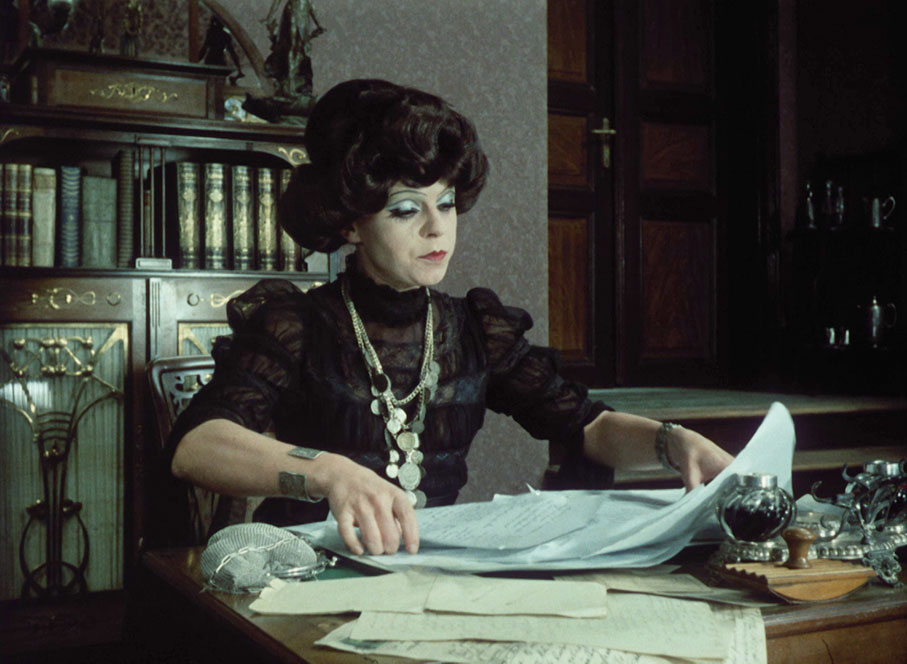 |
The new Morgiana Blu-ray (above) and the 2010 DVD (below).
Note the extra picture information on the left and right sides and bottom of frame
on the Blu-ray transfer, as well as the slight reduction in the DVD's earthier hue.
The incresed sharpness is hard to show on a screen grab this size.
|
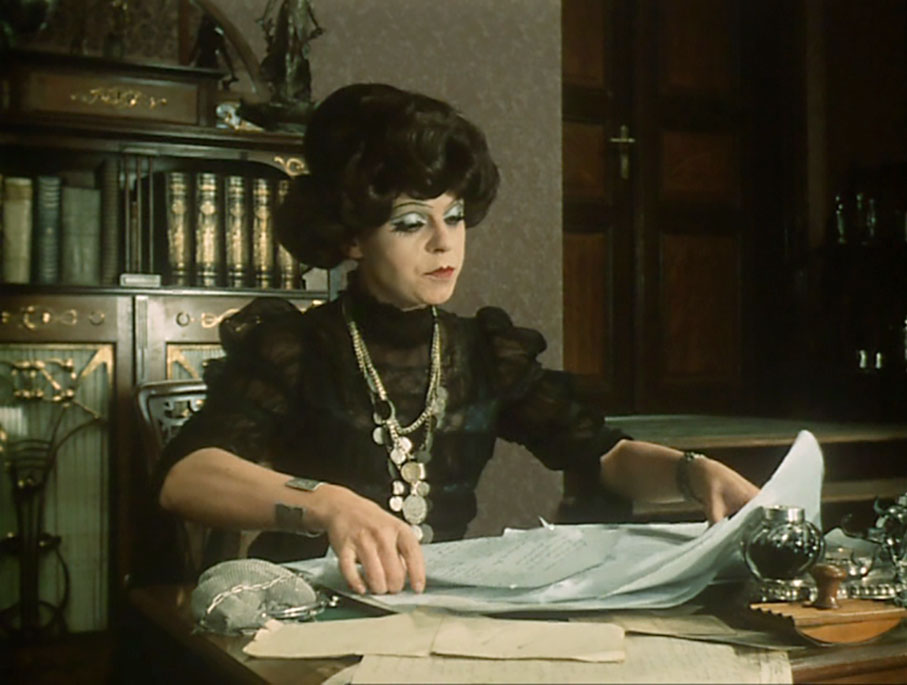 |
A key difference, unsurprisingly, is one of definition. The DVD transfer was a good one, but the image is noticeably crisper on the Blu-ray, with fine detail on clothing, furniture, jewellery and faces all more clearly defined than on the DVD, and while the strong black levels and well-balanced contrast range remain, the shadow detail is slightly more forgiving here. The often warm colour scheme is nicely reproduced, and the earthy hue of its predecessor has been reduced to give the image a more natural feel. The stronger colours that do intermittently appear – bright blue skies and some of the dresses and accessories in particular – are vibrantly rendered. It’s also worth noting that the framing here is slightly wider than on the DVD transfer, adding a small amount of picture information on the bottom and both sides of the frame. On the whole, an impressive job with imperfect material, and despite the dust spots, minor damage and reel-change markers that remain, the best material here looks really good.
The Linear PCM 2.0 mono soundtrack has an unsurprisingly narrow tonal range, with a slightly harsh treble bias to dialogue that is nonetheless always clearly audible, and the more dramatic chords of Lubos Fiser’s music score have a pleasing degree of oomph. There are precious few obvious signs of damage and wear.
Optional English subtitles kick on by default, and, as expected, are considerably sharper than those on the DVD.
The Projection Booth Commentary with Mike White, Kat Ellinger and Ben Buckingham(87:52)
This is not a commentary in the traditional sense and this actually an episode of The Projection Booth podcast in which host Mike White is joined by Kat Ellinger and Ben Buckingham to discuss Morgiana and its director, Juraj Herz. You’ll not see me complaining, as the enthusiasm that these three have for this film makes this a treat for cineaste ears, with Ellinger in particular passionate about what she describes as one her very favourite works of Czech cinema. White takes something of a back seat here, allowing Ellinger and Buckingham to monologue at fascinating length about aspects of the film and the style and career of director Herz, and while both make excellent and compelling points, the comment that made me smile the widest came from Buckingham, when he described Herz as, “a fucked-up dude who was willing to go to really, really nasty weird places.” The eroticism in the director’s cinema is discussed, as is the role of duality and mirrors in this film and others in Herz’s oeuvre, and Ellinger has some very personal reasons for siding with the scheming Viktorie – “Yeah, kill the smug sibling!” she says with cheerful venom. Many other Czech films get discussed that I am shamefully unfamiliar with, but with the sort of eagerness that made me want to hunt them out and watch them all. An excellent companion to the film.
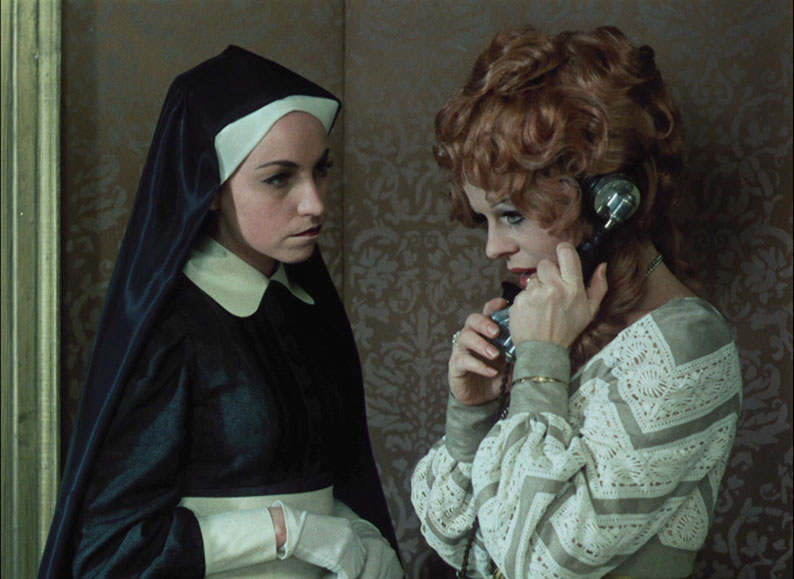
Interview with Juraj Herz (2010) (15:28)
In a revealing interview carried over from the 2010 DVD, director Herz talks frankly about why he chose to adapt Grin's novel, how he differed from his fellow Czech filmmakers of the day, and the technical issues of having an actress play a dual role. He discusses his relationship with cameraman Jaroslav Kucera and their fondness for wide-angle and experimentation, as well as his direction of music, the government reaction to the film, and more.
Also included in the package is essentially the same Booklet that accompanied the 2010 DVD release, but that’s no bad thing at all, as included within is a useful introduction to Herz's work by freelance writer Daniel Bird, and a more analytical piece on Morgiana and The Cremator by Dr. Ian Conrich, a leading writer on Gothic cinema.
A still gloriously seductive and semi-experimental slice of gothic strangeness that looks better than ever in its HD incarnation, despite the small remaining picture flaws. Is it worth the upgrade if you already have the DVD? For the image quality improvement alone I’d say yes, but the addition of the Projection Booth commentary really seals the deal. If you never seen the film and have a taste for offbeat and visually striking gothic drama, or have seen Herz’s extraordinary The Cremator and want to see what else the man can do, I’d stick this on your shopping list immediately. Highly recommended.
* Grin was apparently regarded by some as the Russian Edgar Allen Poe and is so described in the accompanying booklet.
** This casting decision may well stem a key aspect of Aleksandr Grin's original story, Jessie and Morgiana, where Viktorie and Klára were apparently dual personalities of a single person. I have, I should point out, neither read the story nor been able to confirm this, but in the accompanying interview, director Juraj Herz states that schizophrenia was a strong aspect of his original edit but that the scenes in question were cut by the state.
This review has been updated from my 2010 review of the Second Run DVD.
|